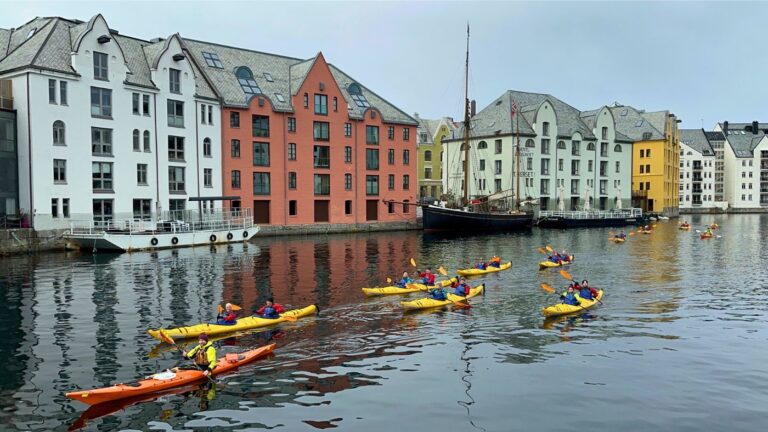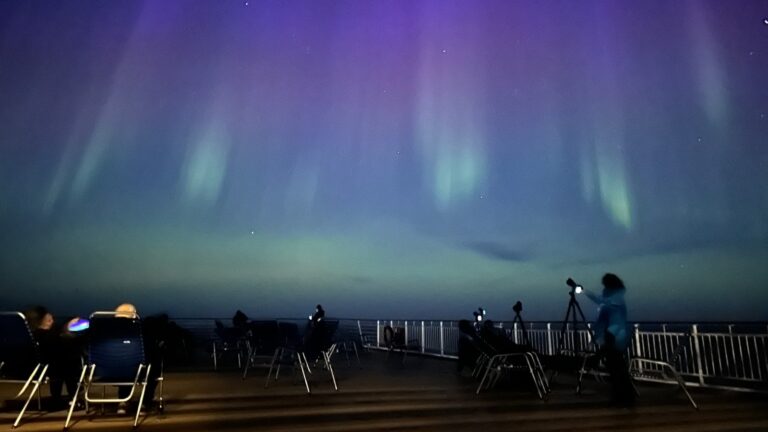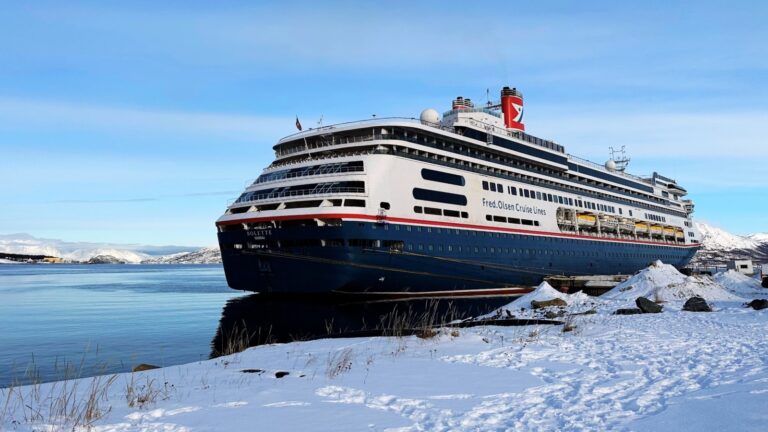Norway’s booming tourism industry offers exciting job opportunities, but landing one as a foreigner depends on the season, your skills, and, in many cases, the languages you speak. Here’s what you need to know.
Norway’s tourism industry has never been busier. From the majestic fjords of the west coast to the northern lights in the Arctic north, the country attracts millions of visitors each year.

While the summer season remains the busiest period, tourism is now spread more evenly throughout the year thanks to growing interest in winter travel, northern lights tours, hiking holidays and coastal cruises.
This boom in visitor numbers has created more opportunities than ever in the tourism sector.
Whether you dream of leading guided tours through dramatic landscapes, welcoming guests at a fjordside hotel, or working behind the scenes at a visitor centre, there’s a growing demand for people to keep the industry running.
But how realistic is it for a foreigner to land one of these jobs—especially if you don’t speak fluent Norwegian?
The short answer is: it depends. There are jobs available, but most come with conditions. Tourism work in Norway is often seasonal, and language ability plays a much bigger role than many first-time applicants expect.
In this article, we’ll walk you through the realities of working in the tourism industry in Norway today, including where the jobs are, what skills you’ll need, and how to maximise your chances of getting hired.
A Seasonal Industry
One of the defining features of Norway’s tourism industry is its seasonality. Most jobs in the sector are tied to either the short but intense summer season (typically from May to August) or the increasingly popular winter season (from November to March), particularly in Arctic destinations.

This strong seasonal focus is a key reason why many tourism jobs in Norway are temporary or short-term contracts, rather than year-round permanent positions.
Businesses, especially in smaller towns or remote areas, simply don’t have the visitor numbers to support full-time staff throughout the year.
In the summer months, demand peaks for walking tour guides, drivers, cruise excursion hosts, outdoor activity leaders, hotel staff, and workers in cafés, campsites, and souvenir shops.
Norway's most popular cruise ports such as Geiranger, Ålesund, and Bergen come alive with international guests, and the need for English-speaking staff increases.
In winter, the opportunities shift northward. While fewer roles are available overall, there’s still strong demand in places like Tromsø and Alta, particularly for those working in northern lights tourism, dog sledding, snowmobile guiding, and guest services at ski resorts or Arctic lodges.
Most seasonal tourism jobs are advertised several months in advance. Applying early is recommended, especially for roles that include accommodation or are in remote locations.
Can You Get a Tourism Job Without Norwegian?
The short answer: sometimes—but it’s getting harder. Most Norwegians speak excellent English, and English is often the working language in tourism. But employers increasingly expect foreign staff to learn some Norwegian, especially for anything more than a short-term summer role.
In practice, this means:
- Norwegian is often required for roles involving direct contact with local suppliers, driving jobs, and most year-round positions.
- English-only roles do exist, but usually on short-term contracts with international companies or in niche roles aimed at English-speaking tourists.
- Tour guides are often expected to speak three languages: Norwegian, English, and one more (often German, French, or Spanish). More on this later.
Some walking tour companies do hire foreign students or working holiday visitors to lead English-language city tours, especially in Oslo and Bergen, but these roles are competitive, and pay is often partly tips-based.
Working as a Tour Guide in Norway
Working as a tour guide in Norway can be a fulfilling and memorable job, but it is also a competitive field with growing expectations. Opportunities exist in many forms, including walking tours in the cities, full-day coach excursions, boat trips through the fjords, and multi-day adventure tours in the wilderness.
However, in recent years, employers have raised the bar when it comes to experience, language ability, and formal training.
Expectations for Working as a Tour Guide
In most cases, certification is now a requirement. Although the profession is not strictly regulated nationwide, many reputable tour companies will only hire certified guides. This typically involves completing a recognised course and passing both practical and theoretical assessments.

Some programmes are operated by private guide schools, while others are affiliated with regional tourism organisations. In places like Svalbard, additional safety certification is required due to the remote environment and risk of polar bear encounters.
Language ability is another key factor. While English remains the common working language in the tourism sector, it is rarely enough on its own. German is especially valued by employers, given the large number of visitors from German-speaking countries.
Other languages such as Spanish, French, Dutch and Italian are also useful. In many cases, employers expect Norwegian too, even at an intermediate level. This is particularly important for communicating with local partners, colleagues, and suppliers.
Most guiding jobs are seasonal. The majority of contracts cover the summer months from May to September, with some stretching into October. This is when cruise ships visit the ports and international tourists explore the fjords and cities.
There are some opportunities in the winter, particularly in the north of Norway, where activities focus on snow-based excursions and northern lights tourism. These roles tend to be more specialised and may require previous experience in winter conditions.
Employment Conditions for Tour Guides
Employment conditions have improved in recent years. Reputable companies now offer proper contracts that include guaranteed hours, paid holiday, and sometimes accommodation or travel support.
However, tip-only roles still exist, particularly with so-called “free” walking tours in the larger cities.
These jobs may seem appealing at first but often lack job security or a stable income. Anyone considering this type of work should ask clear questions about how and when they will be paid.
For those looking to stay longer in the industry, specialist guiding can open additional doors. In Svalbard, for example, certified guides lead glacier hikes, wildlife tours and polar expeditions, all of which require specific safety training.
In the mountains, ski guides often follow a separate path involving national or international certifications. These roles tend to demand higher qualifications but can also lead to more stable year-round work.
Do You Need a Work Permit?
This depends on your nationality, the type of job, and how long you plan to stay.
- EU/EEA citizens can work freely in Norway but must register with the authorities for longer stays.
- Non-EU citizens need a work permit. For tourism jobs, this could be a skilled worker permit, a seasonal worker permit, or (in some cases) a short-term exemption.
One important exception: if you’re working as a tour guide employed by a foreign company, and you’re only in Norway for up to 90 days, you may be able to work without a permit. This only applies to guides who are accompanying international tour groups.
For everyone else, you’ll need a proper contract and a valid permit. Check out our guide to Norwegian immigration for more details.
Cruise Ships and Coastal Voyages
If you're interested in working in Norwegian tourism but want to avoid the paperwork involved with moving to Norway, working on an international cruise ship can be an excellent option. These ships regularly visit Norwegian ports throughout the summer and often hire staff from all over the world.

By contrast, working on a Hurtigruten or Havila coastal voyage that operates within Norway typically requires residency and a solid grasp of the Norwegian language.
Cruise ships that sail internationally—including those operated by major global cruise lines—employ a wide range of staff in hospitality, entertainment, guest services, kitchen, and cleaning roles.
Contracts generally last between two and nine months, and as the onboard language is almost always English, you don’t need to speak Norwegian.
Because these ships are flagged and managed outside Norway, you don’t need to register as a Norwegian resident to work on board. This can be a great way to experience Norway and the wider world while earning a wage and gaining international work experience.
On the other hand, working aboard a Hurtigruten or Havila vessel is a different story. These ships are Norwegian-flagged and follow national employment regulations.
That means you’ll typically need the right to live and work in Norway, either as a resident of an EEA country or through a valid work permit. In addition, Norwegian language ability is required.
While the experience of working at sea can be similar in both cases—with long working hours, shared accommodation, and a close-knit crew environment—the requirements and recruitment processes are quite different.
Working Holiday Visas
If you’re from a country that has a working holiday agreement with Norway, you may be eligible for a working holiday visa.
This allows you to live and work in Norway for up to a year, usually with a focus on casual or seasonal jobs. Tourism is one of the most accessible sectors for working holiday makers, especially in the summer.
Such a permit is available to citizens from countries such as Canada (ages 18–35), Australia, New Zealand, Japan (typically ages 18–31), Argentina, and a few others within that age range.
Destination Offices and DMOs
Local and regional tourism organisations—often called Destination Management Organisations (DMOs)—exist all across Norway.
However, most DMO roles involve communication with local partners, event coordination, and content production, which all require solid Norwegian language skills. These roles are typically not open to new arrivals or short-term visitors unless you already speak fluent Norwegian and have relevant qualifications.
So, Is It Worth It?
Tourism jobs can be a great way to experience life in Norway and meet people from all over the world. But they’re not the easiest way to stay long-term.
To succeed in Norway’s tourism industry, you’ll need:
✅ Seasonal flexibility
✅ Intermediate Norwegian (or willingness to learn fast)
✅ At least one additional language if applying for guiding jobs
✅ Patience with bureaucracy and work permits
If you’re serious about working in Norway, whether in tourism or another sector, check out our book: How to Find a Job in Norway. It’s packed with advice on how to apply for jobs, write a Norwegian-style CV, and prepare for interviews—plus insights on work permits, language learning, and where to find vacancies.
Other useful resources
- NHO Reiseliv: The Norwegian Hospitality Association is the largest employers and trade organisation in Norway.
- Hotel Jobs in Norway: Information on hotel and other hospitality employment opportunities.
- Visit Norway: The main destination management company in Norway.
- Hurtigruten Jobs: Current available jobs with the company behind the Norwegian coastal cruise.


I’m an American looking to relocate to Norway. I do not speak Norwegian. Have been a chef, paint and body man and mechanic most of my life. Have a lot of experience diving and spearfishing also. What are my chances of landing a job ?
Hey, experience can bring you far. Do you know anyone? Getting a job as an English-speaking person is possible, but that depends on relationships you have. Otherwise you need to know the language.
I am 43 years old and I am italian. I don’t speak scandinavian languages. I am a touring bus driver with 20 years of experience in Italy and central Europe. I would like to do a new experience in Norway like bus driver. Is it possible to work in Norway with mi driving licence? Do you know some links aobout this?
Thanks
Stefano
Hi there.
I’m a Portuguese qualified tour guide, working throughout Portugal and Spain. Guiding here goes beyond from having people following me. It’s quite liked to culture and Art.
After some trips to Oslo and having some friends who live there, I’ve been thinking to expand my boundaries.
I’m fluent enough to work in English, perfect Portuguese, Spanish and Italian. Unfortunately, I don’t speak any Scandinavian language or German.
Have I got any chance to be hired and settle in Norway with a regular salary?
Thanks in advance
Gabriel Vieira.
Hi there.
I am a 30 year old police officer from Romania, with roughly 8 years of experience. I have been working in a multicultural community for several years now. Being an ethnic Hungarian I am a native Hungarian speaker, I am also fluent in Romanian and English. Unfortunately my German is not quite good but I am willing to learn it ASAP.
I’ve made a trip to Stavanger and Preikestolen this year and I fell in love with Norway :)).
What are my chances of getting a job in tourism(or elsewhere) and relocating to Norway?
Thanks in advance.
My partner maybe able to get a job in Norway in Kristiansands and there is a possibility that I maybe able to keep my Uk based office job and work remotely. I work in sales but just in case they decline. How hard would it be to get a full time job around this area! I am very adaptable and willing to try my hardest to learn the language any advise?